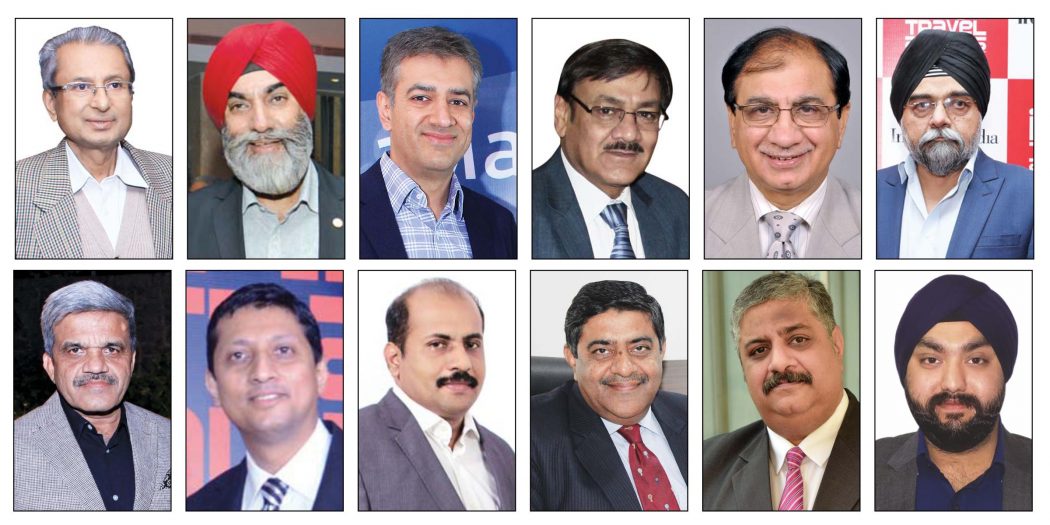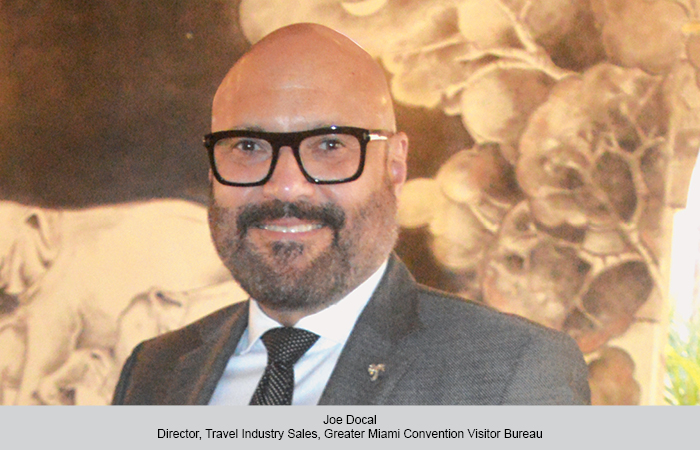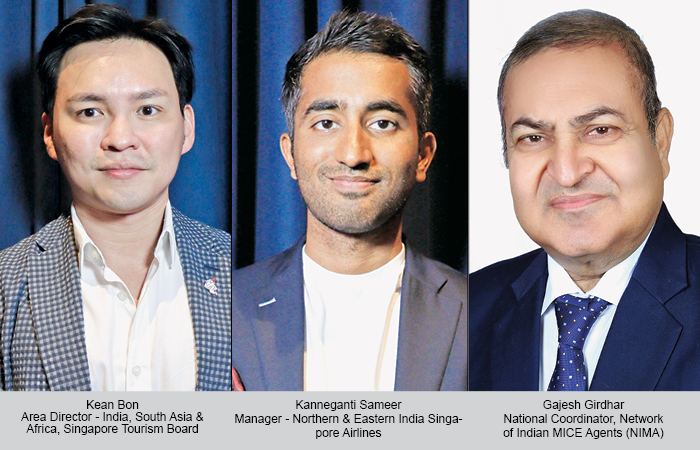The GST Council finalised the tax rates of services under the Goods and Services Tax (GST) recently and the tax system will be effective from July 1. With five per cent rate for tours and 28 per cent for luxury hotels, travel trade professionals are trying to comprehend how business will be impacted. TRAVTALK gives you an insight…
Pronab Sarkar, President, IATO
GST was awaited for a long time and we were demanding from the government that since there is a lot of multiplicity of taxes in the tourism sector, the taxes should be rationalised and reduced. I am glad that the government has agreed to both the requests and has given us the same status that we wanted with 5 per cent GST rate. Also, there is no Input Credit on that. We are only concerned about one aspect–hotels–as they have put 28 per cent GST on hotels over Rs. 5000 which should not be more than 18 per cent. The government should look to attract more tourists and get a bigger chunk of foreign exchange, which will not only generate revenue but also generate employment opportunities in the hospitality industry.
Guldeep Singh Sahni, India Travel Award winner and President, OTOAI
The government went two steps back and now they have come one step ahead with the current GST rate. We were giving 4.5 per cent tax before January 22, 2017, and then we had CENVAT available. After January 22, we were under 9 per cent service tax. This step disturbed our summer bookings and there was a major loss of business to international OTAs. The new rate that will be implemented after the GST council’s meeting is 5 per cent on supply of tour operators’ services. We need to clarify the meaning of this. If it is on the profit or add-on, then it’s very good. But if it is on the total amount, then we again turn expensive by 5 per cent than our international suppliers, because if we are taxing international hotels, then we are taxing them again. This has direct impact on us.
Dr. Ankur Bhatia Executive Director Bird Group
Hospitality industry in India, a big contributor to the country’s economic growth, is on a high growth trajectory and is expected to reach Rs. 2,796.9 thousand crore by 2022 (source: KPMG). The industry also contributes significantly to employment, FDI and foreign exchange. The industry was severely impacted by the liquor ban and the much-awaited GST rates have come as another shocker. These high and complex GST rates will further act as impediments to the industry’s growth which is still maturing. At the same time, the new tax structure will also position India poorly as a destination vis-a-vis our competitors in the international market that have much lower taxation.
P. P. Khanna, President, ADTOI
According to the GST Council, there will be 5 per cent tax on tours. However, it is not clear whether this rate is applicable on value addition or gross amount. In a way, the 5 per cent rate is good as we were already paying 4.5 per cent tax on the packages. The service tax amendment of 9 per cent tax was more cumbersome for us, as applying for CENVAT was an issue, especially with small tour operators and small hotels not being systematic in generating proper invoices. The government has taken special consideration for tour operators, as this process was difficult for us.
Chander Mansharamani Vice Chairman, ICPB
The GST slabs announced for hospitality industry will negatively affect inbound tourism immediately, especially when we are in competition with neighbouring countries. The MICE industry will be terribly hit as most of the convention facilities are only available in 5-star hotels that have room rates of Rs. 5000 or above. The high tax rate will also negatively impact conventions and conferences in the pipeline. I feel scope for manipulation has been left for hotels where they can charge Rs. 4990 for a room and pay only 18 per cent instead of 28 per cent. Also, there is confusion as to whether the tax will be charged on rack rate, published rate or negotiated rate.
Sarab Jit Singh, India Travel Award winner and Vice Chairman, FAITH
The 28 per cent tax on hotels is going to affect not only the hospitality industry, but other businesses as well. It is a clear way to kill the travel and hospitality industry. GST of 5 per cent on tour operators already existed. The government should mull over whether they just want to earn tax revenue or promote tourism and earn foreign exchange from this sector. They should decide if they want the tourism industry to perish or flourish. We are tired of knee-jerks that we get from the government every now and then. I think the government needs to rethink the decision on taxes. We will meet FAITH members soon and work on a consolidated approach to talk to the government on this.
Rajan Sehgal Chairman–Northern Region, TAAI
There has not been much of a difference in air travel except in the taxes on economy and business class. However, since hotels will be subjected to 28 per cent tax for over Rs. 5000 room rate, it will be a huge blow to them. We were expecting about 18 per cent, which has been applied, but for hotels in the Rs. 2500- 5000 range. Our aim is to get more foreign tourists to India, and not just domestic tourists, and by hiking up the main part of travel will not benefit the industry in any way. Our price needs to be competitive in comparison to the European market or other markets in Asia where the rates for such services are much lower.
Debjit Dutta, Chairman, IATO East Chapter
The announced tax slab on tour operators is satisfactory. Since hotels are a major component of our business, the 28 per cent tax on hotels above Rs. 5000 will hit us badly. Most inbound tourists want to stay in properties that are above this bracket. The business model for inbound is also different from that of domestic – we create our deals and packages a year in advance and with the new tax rate for hotels, we will have to pay 28 per cent and 5 per cent, in addition to the standard rate of the hotel room. This barely leaves us with any profit margin. The tax rate needs to be reassessed.
P. K. Anish Kumar, President, ATTO
I am very disappointed with the announcement. Most foreign travellers have concerns regarding security and cleanliness in India and thus choose 4 or 5-star hotels. This does not mean they are rich but prefer safe, quality accommodation. The 28 per cent tax on hotels and 5 per cent GST to be paid by agents, kills the industry as the effective tax to be paid will be 33 per cent. A houseboat in Kerala costs above Rs. 6000 and the tax will deter the USP of the destination. India will not be seen as a long-haul destination any more as packages will become shorter due to the expenses to be incurred by foreign tourists.
Anil Parashar, President & CEO, InterGlobe Technology Quotient, India Travel Award winner
Against the backdrop of a high growth potential of the Indian travel and tourism market, an organised tax structure is vital. The implementation of the unified tax structure is a huge step towards preparing the nation that is expected to grow at $160.2 billion by 2026. Although, the industry presently has mixed reactions towards the introduction of GST, going forward, this step would attract more industry growth as the GST has been planned according to the tax payer’s capability. For example, GST Council reduced service tax on economy class from 6 to 5 per cent while increasing that of the Anil Parashar business class to 12 per cent from the current rate of 9 per cent.
Rishi Puri, VP, Lords Hotels & Resorts
Post successful initiatives like Make in India, Swachh Bharat and Startup India, we were hoping for a more reformative GST that would have rationalised the tax structure and made India a more competitive tourism destination. Unfortunately, the recently announced GST rate for hotels will do just the opposite. By increasing the rate to 28 per cent for mid-to-high class hotels priced above Rs. 5000, inbound tourism will take a hit by at least 10 per cent. More ironic is the zero tax on hotels with tariffs of Rs. 1000 or below. The signal that is being sent out is, India would prefer only backpackers and for those with more money to spend should look for other destinations. We humbly request the government to save inbound tourism and reconsider GST for hospitality.
Manheer Singh Sethi, Co-founder, Travkart.com, a unit of Holidays by Sahibji, India Travel Award winner
The passing of GST Bill is a great step forward and establishes a uniform tax structure. Tourism is not only a high foreign exchange grosser, but is also among the largest tax generators. The 5 per cent rates on travel agency services is a welcome move. A lower rate will bring in more tourists and allow Indian businesses to compete with global chains. However, the rates in hospitality sector are too complex and high. The government’s effort to keep the rate for restaurants with a turnover of Rs. 50 lakh or below at 5 per cent, is a welcome move. A lower tax rate for the budget hotels sector will ensure that the industry’s quality upgrade continues while delivering standardised accommodation to millions of middle-class travellers. Internationally, the taxes in neighbouring countries like Myanmar, Thailand, Singapore, and Indonesia range between 5-10 per cent. The high incidence of taxes will make India uncompetitive when it comes to tourism.
 TravTalk India Online Magazine
TravTalk India Online Magazine





